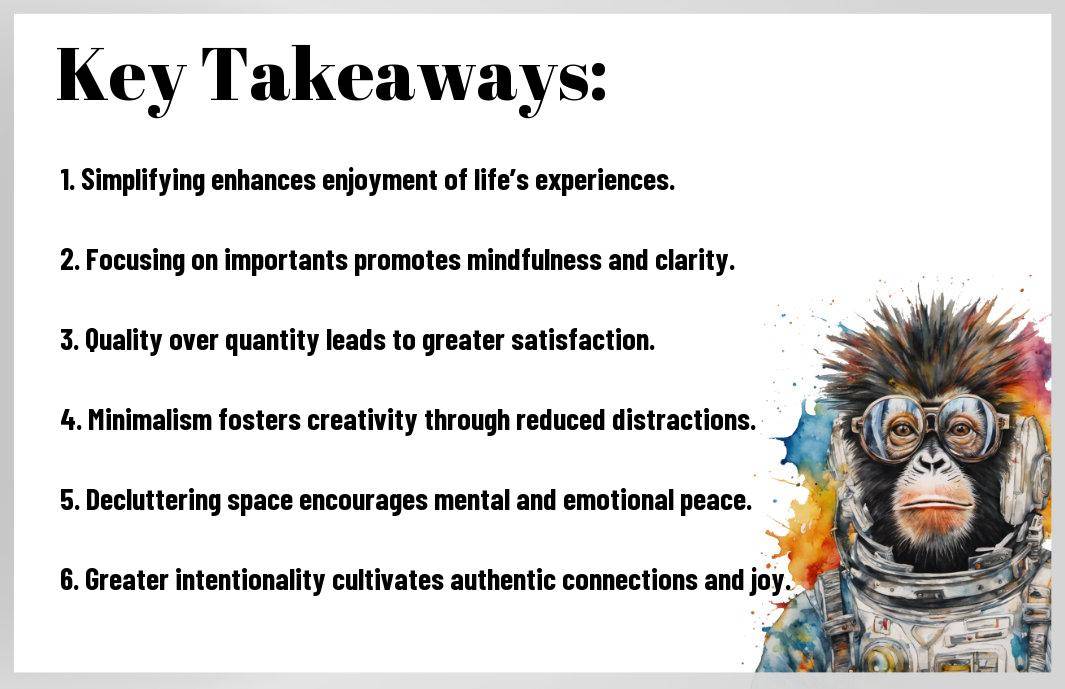
Newsletter Subscribe
Enter your email address below and subscribe to our newsletter

Enter your email address below and subscribe to our newsletter

With the constant buzz of modern life, I often find myself yearning for simplicity and peace. That’s where the concept of Epicurean minimalism comes into play, blending the joys of living simply with the pleasures of the senses. In this post, I’ll share how embracing less can lead to a richer, more fulfilling life by focusing on what truly matters. Let’s explore how you can savor life’s experiences while surrounding yourself with fewer distractions.


To embrace Epicurean minimalism is to cultivate a lifestyle that prioritizes quality over quantity. It invites you to focus on the importants that truly bring joy and fulfillment, allowing you to find pleasure in simplicity. This approach encourages a thoughtful evaluation of your possessions, relationships, and experiences, leading you to savor the moments that matter most. By shedding the excess that often weighs us down, we can create space for the beauty of life’s simple pleasures.
Between the layers of philosophy and hedonism lies Epicureanism, an ancient school of thought that champions the pursuit of happiness through the enjoyment of life’s simple pleasures. It emphasizes the importance of friendship, self-reflection, and the appreciation of nature, all while steering clear of unnecessary desires that can lead to turmoil. For me, this philosophy resonates as it aligns with my quest for a more meaningful existence, where I can derive joy from the world around me without getting bogged down by material excess.
Beauty lies in the uncomplicated moments of life, where the richness of experiences comes from their authenticity rather than their extravagance. When I choose to strip away the noise and chaos, I often discover deeper connections with the people I care about and a renewed appreciation for nature. By embracing simplicity, I find that even the tiniest moments—like a quiet cup of tea in the morning or a leisurely walk in the park—can bring a profound sense of joy and contentment. These moments teach me that less truly can be more.
Indeed, simplicity holds a unique beauty that can transform the way we perceive our lives. It whispers reminders of the joy that can be found in everyday activities—like cooking a meal from fresh ingredients or taking a moment to watch the sunset. In this fast-paced world, embracing simplicity encourages you to slow down and cultivate a deeper presence in the moment, allowing you to appreciate life’s treasures, no matter how small they may seem. Exploring the depths of Epicurean minimalism may just lead you to discover a sense of fulfillment that outward pursuits often overlook.
One of the most powerful benefits of embracing an approach of minimalism in my life is the mental clarity and focus it brings. By reducing the clutter around me, whether it’s physical items or commitments that crowd my schedule, I’ve found that my mind feels lighter and more open to new ideas. You might notice that negative thoughts and distractions often stem from having too much to process. By simplifying my surroundings and obligations, I feel I can concentrate better on what truly matters to me, leading to more productive and fulfilling days.
Beside the obvious reduction of noise in my environment, minimalism has taught me the art of prioritization. With fewer distractions, I can hone in on tasks that align with my goals and values. This newfound focus has sparked creativity and innovation that I didn’t even realize were stifled before. It’s incredible how a clean workspace or a simple calendar can lead to heightened productivity, allowing me to achieve objectives that seemed daunting not long ago.
Along with enhanced focus comes the beautiful realization that I can find joy in the present moment. In a world that often encourages us to chase after more—more possessions, more experiences—I have learned to appreciate what I already have. When I let go of the urge to accumulate, I create space for mindfulness, allowing me to fully engage with my surroundings and relationships. I no longer feel the pressure to rush through life; instead, I savor the little things that bring me happiness each day.
But this journey has also shown me that joy isn’t always found in grand gestures or large experiences. It’s in the laughter shared over a simple meal, the serenity of a quiet moment with a book, or even the warmth of sunlight on my skin. By embracing minimalism, I’ve cultivated a lifestyle where I can truly appreciate these simple pleasures. It’s all about being present and recognizing that happiness often lies in the less complicated aspects of life.
Unlike the overwhelming world of material possessions, embracing minimalism invites you to create a more intentional lifestyle that aligns with your values. Start by assessing the items in your life—what truly brings you joy, and what merely occupies space? I found that when I committed to a process of decluttering, I began to see each belonging’s true purpose in my life. Minimalism isn’t about living with nothing; it’s about choosing to surround yourself with things that resonate with you deeply.
Practical steps for decluttering your space can begin with small, manageable goals. I often start with one room at a time or even just one area, like a closet or a drawer. Each item can be evaluated based on its significance to my life. If an item doesn’t contribute positively or fulfill a need, I consider whether it’s time to let it go. I can assure you, having fewer items around not only clears physical space but also creates a mental atmosphere that feels light and freeing.
Across my journey toward minimalism, I discovered how vital it is to practice mindful consumption. This means being intentional about what I bring into my home and my life. Instead of making impulsive purchases, I now take time to truly evaluate whether something is necessary or just a fleeting desire. By adopting this approach, I find myself more appreciative of what I already own, which creates a cycle of gratitude that enhances my overall well-being.
Consumption isn’t just about the items we buy; it extends to experiences and information, too. Each decision I make about what I consume has an impact on my space and mind. Focusing on quality over quantity allows me to invest more resources into things that truly matter, ensuring that each choice contributes to my minimalist ethos. This way, I’m not only decluttering my physical space but also enriching my life with meaningful experiences and connections.
Once again, the idea of minimalism ties closely to the pursuit of happiness. It’s fascinating how simplifying my life has allowed me to focus on what truly matters, leading to a greater sense of joy and fulfillment. Embracing less means creating space for more meaningful experiences, and I’ve discovered that happiness often resides not in the accumulation of possessions but in appreciating the simplicity of life’s pleasures.
By prioritizing the vitals and removing distractions, I find that my overall well-being improves. The more I let go of unnecessary things and commitments, the clearer my path to happiness becomes. It teaches me to savor life’s little joys and moments of connection, allowing me to cultivate a deeper satisfaction in my day-to-day experiences.
On my journey, I’ve learned that quality truly trumps quantity in almost every aspect of life. When I focus on the few things that add significant value—be it the clothes I wear, the food I eat, or the experiences I seek—I end up feeling far more satisfied than when I have an abundance of lesser items. Investing in quality means I can truly appreciate what I have, savoring every moment and every bite, rather than feeling overwhelmed by excess.
This shift to quality extends to all areas of my life. For example, I’ve come to cherish the items I own because they serve a purpose or spark joy. Each piece adds to my experience rather than detracting from it, and I’ve found that I’m much happier with fewer high-quality possessions than with a drawer full of items I seldom use. It enhances not only my living environment but also my mental state, helping me focus on what I genuinely treasure.
On my path to embracing minimalism, I’ve realized that one of the most significant aspects of happiness comes from the relationships I nurture. By minimizing distractions and investing my time in genuine connections, I experience a richer, more fulfilling social life. Spending quality time with loved ones, listening to their stories, and appreciating their presence turns even the simplest moments into meaningful memories.
For instance, rather than attending multiple social events where I might feel overwhelmed, I now prioritize intimate gatherings with close friends and family. These connections often lead to deeper conversations and experiences that stay with me long after the event is over. The shared joy, laughter, and even vulnerability in a small group can create bonds that enhance my life immeasurably. Fostering these meaningful relationships is another way I’ve cultivated happiness through simplicity, proving that sometimes, less truly offers more.
After embracing the concept of Epicurean minimalism, I quickly realized that the journey wasn’t all smooth sailing. I faced a variety of challenges, but overcoming them made me appreciate the lifestyle even more. One of the primary hurdles was the ever-present consumer culture that surrounds us, encouraging constant purchasing and accumulation of goods. Navigating this landscape required conscious effort and reflection, pushing me to evaluate my values and priorities continually.
By aligning my choices with my values, I found ways to resist the pull of consumerism. Instead of being swept away by advertisements or the latest trends, I began questioning whether new possessions would truly add joy to my life. Crafting a budget that prioritizes experiences over things helped me focus on what truly mattered, allowing me to enjoy life without the pressure of ownership. Over time, I even found joy in living with less and realized the beauty of simplicity.
Against the backdrop of society’s materialism, staying motivated to embrace minimalism can feel like an uphill battle. I had to build a support system around me, filled with friends and resources that championed my journey. Habitually revisiting my goals and celebrating small victories helped me stay grounded, reminding me that each step taken towards minimalism was a step towards a more fulfilled life.
But it wasn’t just about external motivation; I had to tap into my internal drive as well. Reflecting on why I chose this path kept my passion alive. I often journaled my thoughts, noting how lightening my load brought clarity and joy into my life. By focusing on the positive changes I experienced, the daunting consumer culture became less of an obstacle and more of a challenge I was eager to tackle.

All around us, stories of transformation light up the path to Epicurean minimalism. It really is inspiring to see how people like us take a step back and reassess what’s important in their lives. By shedding the excess and embracing simplicity, they have created room for joy, connection, and peace. As I reflect on various journeys, I find it’s often the small, everyday choices that set off the most profound changes. These tales remind me that it’s never too late to start living with intention.
One incredible example that comes to mind is the journey of a friend who decided to declutter her home after feeling overwhelmed by her possessions. She realized that the endless cycle of consumerism had hijacked her joy. By choosing to let go of items that no longer served her, she discovered a newfound zest for life. Her home became a sanctuary, allowing her to focus on meaningful experiences with family and friends, rather than being distracted by what she owned.
With Epicurean minimalism, the concept is not just about decluttering but also redistributing your energy and focus. I find that when I apply these principles to my daily life, it encourages me to appreciate quality over quantity, fostering deeper connections with people and experiences. By cutting distractions and simplifying my surroundings, I can engage wholeheartedly with what really matters to me.
To practice minimalism in action, I recommend starting small. Perhaps you could tackle a single drawer or closet in your home, letting go of what you don’t use or cherish. As you fold away clothes that no longer bring you joy or discard baking pans you haven’t used in years, you’ll likely feel an immediate sense of lightness. This process not only frees your space but can also inspire you to apply the same principles to other areas of your life—like your schedule or even your social interactions. Just imagine how invigorating it could feel to walk through your day surrounded by only what truly enhances your life!
Upon reflecting, I find that embracing the philosophy of Epicurean minimalism has genuinely transformed my outlook on life. It’s fascinating how stripping away excess allows me to focus on what truly brings joy and satisfaction. When I prioritize experiences and relationships over material possessions, I notice a profound shift in my happiness levels. The idea of ‘less is more’ resonates with me, as it encourages a deeper engagement with the things I choose to keep rather than allowing clutter to distract me. If you’re curious to explore this concept further, I suggest checking out Less is More: The Essence of Minimalist Living, which explores into the core of minimalistic living.
A: In the context of Epicurean Minimalism, “Less is More” emphasizes the idea that simplifying one’s life can lead to greater satisfaction and happiness. By focusing on fewer, more meaningful experiences and possessions, individuals can enhance their overall well-being and enjoy a more fulfilling life.
A: Epicurean Minimalism centers on the philosophy of Epicureanism, which advocates for pleasure and the avoidance of pain through simplicity. While traditional minimalism often prioritizes minimalism for the sake of aesthetics or reducing clutter, Epicurean Minimalism focuses more on the quality of experiences and the enjoyment derived from important things, encouraging individuals to find joy in simplicity rather than merely reducing quantity.
A: To embrace Epicurean Minimalism, individuals can start by identifying and eliminating unnecessary possessions or commitments that do not bring joy or fulfillment. They may also focus on cultivating meaningful relationships, prioritizing time spent in nature, practicing mindfulness, and engaging in activities that promote happiness and well-being, ensuring that their choices reflect their personal values.
A: Yes, adopting Epicurean Minimalism can generally improve mental health by reducing stress and anxiety associated with clutter and overwhelming commitments. By focusing on what is truly valuable, individuals can experience a sense of clarity and purpose, leading to increased happiness and reduced feelings of overwhelm. This simplified approach allows for more meaningful engagement with life and fosters a greater appreciation for the present moment.
A: No, Epicurean Minimalism is not about eliminating all material possessions. Instead, it advocates for intentionality and quality over quantity. It encourages individuals to cherish and appreciate belongings that contribute positively to their lives rather than accumulating items for the sake of ownership. The goal is to create a lifestyle that values true enjoyment and fulfillment while minimizing distractions and excess.
A: Individuals can measure the impact of Epicurean Minimalism by assessing their overall satisfaction, levels of stress, and sense of purpose. Keeping a journal to reflect on feelings before and after adopting minimalism can provide insights into changes in happiness. Additionally, noticing how relationships, daily activities, and overall well-being improve can serve as indicators of the effectiveness of this lifestyle change.
A: Absolutely! Epicurean Minimalism can be integrated into family life by encouraging family members to evaluate what brings them joy and fulfillment. Families can work together to simplify their surroundings, prioritize shared experiences over material gifts, and foster deep connections through quality time. By collectively embracing these values, families can create an environment that nurtures happiness and satisfaction for everyone involved.